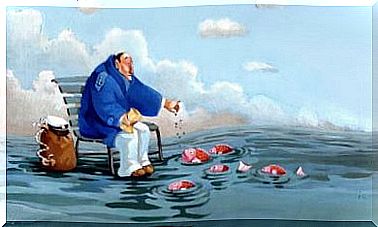Living With OCD: What Does It Mean?

Have you ever considered what it would be like to be obsessed with order, being clean and tidy and following certain rules? Does it ever happen to you? Obsessive Compulsive Disorder — either OCD or OCD from English — has two main components. Obsessions first invade one’s thoughts and compulsions follow from this to reduce the additional stress.
The cycle between the appearance of an obsession and the development of a compulsion defines the lives of people with OCD. They have to deal with a great deal of suffering, fear and misunderstanding. They spend a lot of time fighting off obsessive thoughts through their compulsions. In this article we explain what their day to day life looks like. Here we go deeper into thoughts, emotions and the fears they carry with them.
Anxiety is an important part of OCD
People with OCD struggle with an awful lot of anxiety. It follows them like a true shadow. Why? Because fear and the need to avoid it ultimately drives most of our behaviors. When an obsession rears its head, their anxiety is stoked. If they are unable to perform the compulsion(s), their anxiety becomes all the worse. Thus it can take on an even more sickly form.
Imagine someone who is obsessive in his head about having clean hands (because otherwise he will become seriously ill, for example). He feels almost no fear while washing his hands. But who can stand with their hands under the tap all day long? Whose skin can be in constant contact with soap without experiencing any ill effects?

Imagine that same person on public transport, getting on a subway, thinking about all the bacteria on everything he touches. Because he is now in a place where he cannot perform his compulsion, he experiences a lot of fear. This will increase by the minute as long as he can’t wash his hands.
It’s easy to see that their ability to live a normal routine is dramatically reduced. People with OCD will go to extreme lengths to avoid situations where they cannot perform their compulsions, or where they are confronted with their obsessive thoughts (in the previous example, those are dirty places). Because of this, their lives will be limited to their own home, nearby places and a small social circle. As a result, their social activity is low.
Fear of their own thoughts
People with OCD are afraid of their own thoughts. They fear that just thinking about something increases the likelihood that it will actually happen. Also, people with OCD create rules and standards about what they can and cannot think about. If they don’t feel these rules, according to them, something terrible will happen. In these cases, fear is the basic emotion they feel. The compulsion is an unsuccessful strategy that perpetuates this fear.
It is impossible to have total control over your thoughts. Try not think about a pink elephant will just make sure that you do think of. People with OCD have the same thoughts as everyone else, but they confront them in a way that only makes them more intense.
People with OCD may want to eliminate everything in their head that causes fear. Since this is impossible, they become afraid of their own thoughts. People with OCD are afraid of not being in control of their own thoughts. They want to think only of pleasant things, but all their attempts to do so fail—because it’s simply impossible.

How can you help?
People with OCD are therefore always fixated on what their head is saying to them. That’s because they constantly try to keep their minds in line by employing ineffective strategies. When their efforts fail, what used to be just nervousness becomes actual fear. At such times, it feels like only a compulsion can bring them back to their ‘safe place’. They live as prisoners of their own thoughts, unable to affirm that nothing bad will happen if they don’t perform their compulsion. Every day they try to control the uncontrollable.
If you know someone with OCD, it’s important that you don’t try to reason with them. They already know that the chances are slim that what they fear will come true. In other words, they are not psychotic, nor have they otherwise lost their connection to reality. They know they are exaggerating their control over matters, but their fear is powerful enough to send them into a downward spiral from which they can no longer climb.
The best thing you can do is encourage them to seek the help of a psychologist who specializes in OCD or anxiety disorders. You can help them find such a person and if they trust you enough, you can even go to their first session with them. OCD can be very debilitating. However, there are therapeutic strategies that have been proven effective in reducing the negative impact on the daily lives of those who suffer from it.









